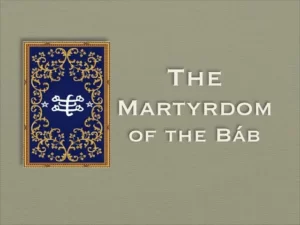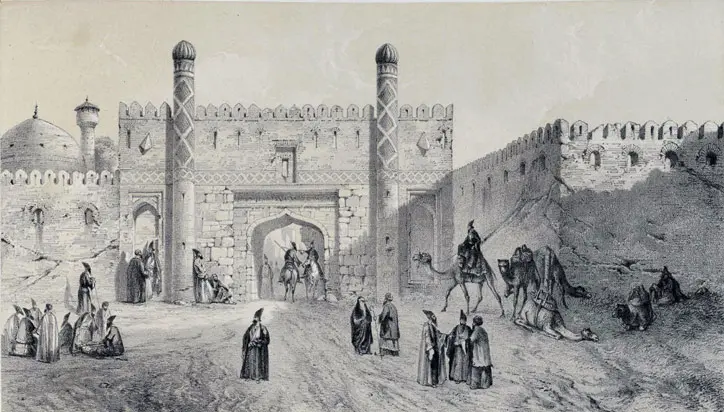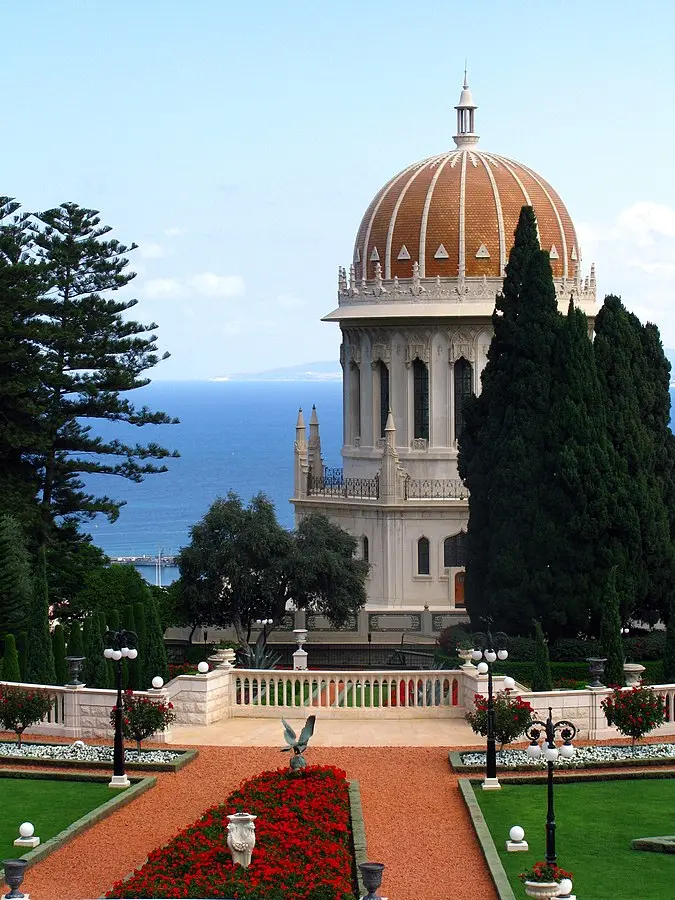
Introduction
On this solemn anniversary of July 10th, 2023, we gather to honour the life and martyrdom of the Bab. His untimely death, facing a firing squad in Tabriz, Persia, on July 9th, 1850, serves as a powerful reminder of his enduring legacy. As followers of the Bab around the world unite at noon, we find solace and strength in the readings and prayers from the Baha’i Scriptures. Today, we pay tribute to the profound impact of the Bab’s teachings and reflect on the profound lessons his life and sacrifice impart to us all.
Mirza Ali Muhammad, as he was known at birth, was born in Shiraz in 1819. At the age of 30, he assumed the title of the Bab, which means “the Gate.” Like the biblical figure John the Baptist, the Bab foretold the coming of a Mighty Messenger of God. This Messenger was Bahá’u’lláh, the Prophet and Founder of the Bahá’í Faith. However, the Bab was also a Prophet in his own right, revealing a Holy Book called the Bayan, as well as numerous tablets and prayers. His Dispensation, a period of six years from 1844 to 1850, witnessed a remarkable following, with thousands of devoted believers willing to sacrifice their lives for his cause. Despite facing persecution and opposition, the Bab fearlessly disseminated his teachings, calling for spiritual renewal, unity, and justice. His unwavering commitment to his beliefs ultimately led to his execution in Tabriz in 1850 at the young age of 31. The story of the Bab’s life and martyrdom stands as a testament to the power of faith, resilience, and the enduring quest for truth.
The Bab’s Prophetic Revelation and the Path of Sacrifice:
The Bab, Mirza Ali Muhammad, entered the world stage in 1844, unveiling a prophetic revelation that would transform the course of human history. In the manner of John the Baptist, the Bab’s mission was to prepare humanity for the advent of Bahá’u’lláh, the Prophet-founder of the Bahá’í Faith. Through His teachings, the Bab ignited a spiritual revolution that would shake the foundations of society and challenge age-old norms and beliefs.
Bab’s Revelation brought forth a new understanding of spirituality, emphasizing the unity of all religions and the intrinsic worth of every human soul. His writings, including the Bayan, a Holy Book that outlined the laws and principles of His Faith, continue to guide and inspire believers to this day.
The path that the Bab embarked upon was one of selflessness and sacrifice. He faced relentless opposition from religious and political authorities who sought to suppress His message. Despite enduring persecution, imprisonment, and eventual martyrdom in Tabriz in 1850, the Bab’s unwavering commitment to His divine mission and the transformative power of His Revelation remained unshaken.
Bab’s life and teachings hold profound lessons for humanity. They call us to reflect on the importance of spiritual renewal, the pursuit of truth, and the inherent worth of every individual. In a world plagued by division and conflict, the Bab’s message of unity and justice resonates as a beacon of hope, reminding us of the transformative potential of faith and the enduring power of love.
As we commemorate the life and sacrifice of the Bab, we are invited to embrace the path of sacrifice in our own lives. Like the Bab and His followers, we can strive to embody the principles of unity, justice, and compassion in all our actions. By doing so, we honour the legacy of the Bab and contribute to the realization of His vision—a world where all people are united in their pursuit of spiritual truth and the betterment of humanity.

A Violent End to a Life of Service:
The circumstances surrounding the martyrdom of the Bab serve as a chilling testament to the unfathomable persecution endured by those who dare to challenge the entrenched powers of their time. Falsely accused, subjected to the horrors of imprisonment, and relentlessly pursued, Mirza Ali Muhammad met his tragic fate in the year 1850, when he was unjustly executed in Tabriz. In the face of such heinous brutality, his steadfast resolve and unwavering commitment to his divine mission stand as a beacon of courage and inspiration for all.
In a world that too often condemns and perpetuates violence, the Bab’s martyrdom carries a powerful message. It compels us to confront the forces of intolerance and injustice that still linger, urging us to champion the values of compassion, peace, and equality. The enduring impact of the Bab’s sacrifice serves as a potent reminder that even in the face of unimaginable adversity, the power of truth and the resilience of the human spirit can never be extinguished.
Teachings
The Bab taught how to recognize spiritual truth, the nature of the human being, the meaning of faith, the nature of good deeds, the preconditions of spiritual journey and the question of the eternality or origination of the world. He even, in his Treatise on Singing, explores the philosophy of music.
In many respects, the Báb raised the status of women in his teachings. He taught that since God transcends the boundaries of male and female, God wishes that “neither men exalt themselves over women, nor women exalt themselves over men”.
The Báb also foreshadowed later developments in media, by emphasising the need for a rapid system of news communication, which would be available for all to access, no matter their wealth or social standing.
Rejecting the Use of Force and Embracing Tolerance:
Bab’s unwavering courage in the face of relentless persecution compels us to deeply reflect upon the principles of justice, religious freedom, and the sanctity of human life. His teachings resound with a resolute rejection of the use of force to suppress the beliefs and rights of others. At the heart of his message lies a profound call for compassion, unity, and the recognition of the inherent worth and dignity of every human being.
The Bab’s poignant words, “Let deeds, not words, be your adorning,” encapsulate a profound truth. It is through our actions, guided by the principles of love, justice, and understanding, that we truly adorn our faith. His call for a transformative spirituality challenges us to move beyond mere words and embrace a way of life that reflects the essence of our beliefs.
By rejecting the use of force and embracing tolerance, we honour the legacy of the Bab and reaffirm our commitment to building a world where the rights and dignity of every individual are protected and cherished. Let us heed his call to action, working tirelessly to bridge divides, foster dialogue, and promote a culture of peace and harmony.
Connecting the Past to the Present:
In the tapestry of time, the lessons of the past weave together with the realities of the present, beckoning us to reflect on the recurring patterns of history. As we gaze backward, we have the opportunity to assess our collective journey and glean wisdom from the trials and triumphs of those who came before us. It is within this reflection that we find the echoes of the Bab’s story, resonating in our modern world marred by religious intolerance and persecution.
The Bab’s life serves as a poignant reminder that the persecution of individuals based on their beliefs is a tragic betrayal of the very essence of our shared humanity. His unwavering commitment to justice, compassion, and the rejection of violence in the name of religion illuminates a path forward, urging us to challenge the status quo and dismantle the walls of hatred and division.
It is a sobering reality that in our present age, the flames of persecution continue to engulf countless souls. Open Doors USA, an organization dedicated to monitoring religious persecution, reports that last year alone, an estimated 360 million Christians lived in countries where persecution was alarmingly prevalent. These statistics reveal a harrowing truth – that violence, imprisonment, and the destruction of sacred spaces afflict individuals and communities solely because of their faith. According to Open Doors, at least 50 countries are guilty of “very high persecution.”
How can we, as custodians of our shared humanity, stand idly by as history repeats itself? The crucifixion of Jesus Christ, the persecution of the Bab, and the countless stories of individuals who have suffered for their beliefs throughout time, call upon us to be agents of change. We must speak out against injustice, challenge discriminatory policies, and advocate for the rights and freedoms of all people, regardless of their religious affiliation.
Bab’s teachings, intertwined with the wisdom of the ages, implore us to build bridges of understanding and foster a culture of genuine acceptance. We are called to rise above the divisive rhetoric that engenders fear and animosity, and instead embrace the richness of diversity that adorns the human tapestry. By doing so, we pave the way for a future where the persecution of individuals based on their faith becomes an abhorrent relic of the past.
Let us not forget the words of Martin Luther King Jr., who declared, “Injustice anywhere is a threat to justice everywhere.” The persecution faced by Christians, as well as individuals of other faiths, demands our attention and action. We must stand united, unwavering in our commitment to creating a world where the freedom to believe is safeguarded, and where the light of justice illuminates every corner of society.
Embracing the Bab’s Legacy:
As the anniversary of the Bab’s martyrdom dawns upon us, it is an opportunity for profound reflection on the enduring significance of His sacrifice and the timeless principles He championed. His story is a testament to the indomitable spirit of those who dare to challenge the status quo and champion the cause of truth and justice. It is a reminder that the pursuit of a just and harmonious world demands unwavering courage, resilience, and a commitment to embrace the legacy of the Bab.
In a world marred by religious persecution and the suppression of beliefs, the Bab’s teachings resonate with unwavering relevance. His message reverberates across time and space, urging us to reject the corrosive forces of intolerance and violence, and instead foster an environment where every individual can freely express their beliefs without fear of persecution or discrimination.
Let us, therefore, embrace Bab’s legacy and uphold the principles that He embodied. Let us be catalysts for change, working tirelessly to dismantle the barriers that divide us and to foster a culture of understanding, compassion, and unity. By rejecting religious persecution and embracing the diversity of human experience, we can create a world where the beauty of all faiths and beliefs can flourish harmoniously.
In the face of bigotry and prejudice, let us stand as beacons of hope, advocating for the freedom of belief and the inherent dignity of every human being. Bab’s teachings call us to transcend the narrow confines of our own perspectives and embrace the richness of diversity. It is through this inclusive mindset that we can build bridges of understanding, foster genuine dialogue, and forge lasting connections based on mutual respect and shared values.
In the words of the Bab himself, “Be anxiously concerned with the needs of the age ye live in, and centre your deliberations on its exigencies and requirements.” His wisdom challenges us to be actively engaged in addressing the pressing issues of our time, working collectively to create a world where justice, peace, and compassion prevail.
Embracing Unity and Compassion – A Prophetic Legacy
As we observe Bab’s martyrdom, may we draw inspiration from His profound example of steadfastness and sacrifice. May His legacy and the teachings of Jesus serve as guiding lights, inspiring us to work towards a future where understanding triumphs over ignorance, love triumphs over hatred, and unity triumphs over division. Let us stand firm in our commitment to reject religious persecution, embrace diversity, and foster a world where every individual can freely express their beliefs without fear.
We leave you with a verse from Bahá’u’lláh.
Be ye as the fingers of one hand, the members of one body. Thus counselleth you the Pen of Revelation, if ye be of them that believe.” – Bahá’u’lláh
This verse calls upon us to recognize our interconnectedness and to embrace a sense of unity and harmony among people of different faiths and backgrounds. It reminds us that we are all part of a greater whole, and by working together as one, we can foster a world where religious harmony and understanding prevail.

![]()

